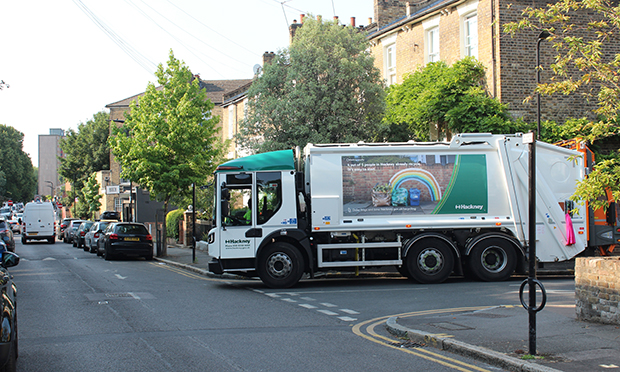Garden waste collection services to be ‘improved’ after council ‘reviews charges and listens to feedback’

Mulch to discuss: questions over garden waste collection costs
Hackney Council says some residents could get a discount for garden waste collection charges, amid accusations that it has been dodging scrutiny over the scheme.
In May, the Town Hall introduced an opt-in subscription for collecting garden waste from ‘street-level properties’, meaning that those in the borough who want their cuttings taken away must now pay £85 a year for fortnightly collections.
The borough’s climate chief, Councillor Sarah Young, yesterday said the charge is vital to help the council claw back £67 million over the next three years, but after “reviewing the charges and listening to feedback”, the service is being “improved”.
Residents who are on certain benefits may get a discount on the scheme, she said, while more flexible arrangements are being mooted for people who do not need regular collections.
“We’re also proposing to introduce one-off collections for people living on council estates who don’t have street collections,” Cllr Young told the Local Democracy Reporting Service (LDRS).
But retired former solicitor Diana Weir, who has been challenging the local authority over its pricing structure and transparency, has accused the council of being dishonest and minimising complaints about the service.
In May, Ms Weir started an e-petition urging the council to at least halve the charge of its “unreasonable” scheme. According to the Town Hall website, it has been signed by 64 residents, which is not enough to warrant debate by the full council.
The petition argued that under the Environmental Protection Act 1990, a local authority can only “recover a reasonable amount” of the cost of collecting garden waste.
In a breakdown of London-wide charges for the same service, Ms Weir put it to the council that it had “considered only the charging rates, omitting the amount of waste collected and the frequency of collection”.
“Once amount and frequency are taken into account and frequency is standardised, the other boroughs’ annual charges are very obviously lower than Hackney’s”.
In a letter sent later to the council’s assistant director for climate, sustainability and environmental services, Sam Kirk, Ms Weir wrote: “It is unlawful for the council’s services to profit by forcing the small minority of Hackney’s gardeners into paying massively more than the reasonable cost of collecting their garden waste, to fund an elaborate cycle of progressively tinkering with and internally reviewing the scheme, without any proper scrutiny.”
She also claims the Town Hall has breached the Local Government Act by refusing to publish a report about her experience with the council, which the Living in Hackney scrutiny committee asked her to provide them with, ahead of a meeting last month.
Hackney Council previously justified the cost by arguing it was in line with neighbouring authorities which also charge for the service, pointing to the examples of Haringey (£80) and Islington (£75).
The Local Democracy Reporting Service asked if the council still maintained that this comparison was fair and accurate, given that Haringey’s weekly collections equate to £1.14 per collection, while Hackney’s fortnightly service equates to £3.30 per collection.
Islington also offers fortnightly collections but for a larger bin, equating to £2.88 per collection.
Islington council’s fortnightly collections are for three bags totalling 270 litres.
A council spokesperson said that charges across the capital range from £50 to £100, and differ due to councils setting their own pay and conditions for staff.
“If residents don’t want to subscribe to the collection service, they can home compost, mulch or take garden waste to a recycling centre,” the spokesperson added.
Local authorities are not yet obligated to collect household garden waste.
However, from 31 March 2026 they will be legally required to do so.
They are currently allowed to charge to recover costs for this service, but not for the disposal.
Enfield Council has an annual charge of £100 per bin which runs from 1 April to 31 March the following year, for a fortnightly collection of a 140 litre or a larger 240 litre green-lidded bin.
Other councils like Islington and Camden offer a discounted service to people on certain benefits, and in the case of the latter, for residents over 65 years old.
Hackney Town Hall has published a report ahead of Monday’s cabinet meeting, which states it rejected the option of reducing the service charge because it could prevent the council from covering revenue costs if subscription numbers were to fall next year.
When asked, the council told the Local Democracy Reporting Service it had received “approximately 10” complaints about the cost of the scheme.
A report from November states there had been “1,070 resident queries, corporate complaints, member enquiries and Freedom of Information (FoI) requests” regarding the service.
“Over 6,500 households in Hackney have subscribed to the service but free alternatives, such as composting or using reuse and recycling centres, are also available,” the spokesperson said.
Independent Socialist councillor, Fliss Premru, previously criticised the new charge in August, after it was revealed only a quarter of eligible households had signed up to the subscription at that point.
“We understand it will take time for a new system to settle in, but we’re concerned that the new charge — more expensive here than in neighbouring boroughs — could act as a disincentive for those on a tight income, particularly if the borough isn’t publicising any assistance which might be on offer for them,” she said at the time.
